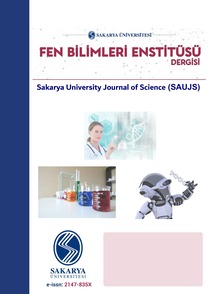Examination of Stability Analysis of Sakarya and Turkey Scale Alcohol Use Model
Examination of Stability Analysis of Sakarya and Turkey Scale Alcohol Use Model
___
- [1] Brownlee, J. (1909). Certain considerations on the causation and course of epidemics. Proc. R. Soc. Med. 2: 243–258
- [2] Brownlee, J. (1912). The mathematical theory of random migration and epidemic distribution. Proc. R. Soc. Edinb. 31: 262–289
- [3] Kermack, W.O., McKendrick, A.G. (1927). Contributions to the mathematical theory of epidemics, part 1. Proc. R. Soc. Edinb., Sect. A., Math., 115: 700–721
- [4] Song, S., Wang, K., Wang, W. (2008). Dynamics of an HBV model with diffusion and delay. J. Theor. Biol. 253(1): 36–44
- [5] Huo, H.F., Ma, Z.P. (2010). Dynamics of a delayed epidemic model with non-monotonic incidence rate. Commun. Nonlinear Sci. Numer. Simul. 15(2): 459–468
- [6] McCluskey, C.C. (2010). Complete global stability for an SIR epidemic model with delay distributed or discrete. Nonlinear Anal., Real World Appl. 11(1): 55–59
- [7] Ma, Z., Xu, R. (2009). Global stability of a SIR epidemic model with nonlinear incidence rate and time delay. Nonlinear Anal., Real World Appl. 10(5): 3175–3189
- [8] Ma, Z., Xu, R. (2009). Stability of a delayed SIRS epidemic model with a nonlinear incidence rate. Chaos Solitons Fractals 41(5): 2319–2325
- [9] Cheng, S., Song, X. (2005). A delay-differential equation model of HIV infection of CD4+ T-cells. J. Korean Math. Soc. 42(5): 1071–1086
- [10] Guglielmi N., Hairer, E. (2001). Implementing Radau IIA methods for stiff delay differential equations. J. Comput. Math. 67(1): 1–12
- [11] Beretta, E., Ma, W., Takeuchi, Y. (2010). Global asymptotic properties of a delay SIR epidemic model with finite incubation times. Nonlinear Anal., Theory Methods Appl. 42(6): 931–947
- [12] Van den Driessche, P., Watmough, J. (2008). Further notes on the basic reproduction number. In: Mathematical Epidemiology. Lecture Notes in Mathematics, vol. 1945, pp. 159–178. Springer, Berlin
- [13] D’Onofrio, A., Manfredi, P., Salinelli, E. (2007). Bifurcation thresholds in an SIR model with information-dependent vaccination. Math. Model. Nat. Phenom. 2(1),: 26–43
- [14] Yi, N., Zhao, Z., Zhang, Q. (2009). Bifurcations of an SEIQS epidemic model. Int. J. Inf. Syst. Sci. 5(3–4): 296–310
- [15] Anwar, M.N., Fathalla, A.R. (2012). Qualitative analysis of delayed SIR epidemic model with saturated incidence rate. Int. J. Differ. Equ. 2012, Article ID 408637
- [16] Hethcote, H.W. (1976). Qualitative analyses of communicable disease models. Math. Biosci. 7: 335–356
- [17] Alzahrani, E., Zeb, A. (2020). Stability analysis and prevention strategiesa of tobacco smoking model,/ doi.org./10.1186/s13661-019-01315-1
- [18] Okongo, O.M. (2015). The local and global stability of the disease free eguilibrium in a coinfection model of HIV7AIDS, Tuberculosis and malaria, IOSR Journal of Mathematics/ISSN:2319-764X.Volume 11.,pp 1-13
- [19] Bhattacharjee, A. (2015). A transmission model for HIV/AIDS in the presence of treatment, IOSR Journal of Mathematics/ISSN:2319-764X.Volume 11.,pp. 72-80
- [20] Momani, S., Zaman, G., Zeb, A. (2013). Dynamics of a giving up smoking model, Elsevier, Applied mathematical modelling , 37.7: 5326-5334
- [21] Adu , I.K. ,Mojeeb Al-Rahman El-Nur, O. , Yang, C. (2017). mathematical model of drinking epidemic, British journal of mathematics & Computer science, 22(5):1-10, ISSN:2231-0851
- [22] Balatif, O., Khajii, B., Labzai,A., Rachik ,M. (2020).Mathematical modeling and analysis of an alcohol drinking model with the ınfluence of alcohol treatment centers, International journal of Mathematics and Matematical sciences, Volume 2020,ID:4903168, pp.12
- [23] Röst, G., Tekeli, T. (2020). Stability and oscillations of multistage SIS models depend on the number of stages,Elsevıer :Applied mathematics and computation,380, DOI: 10.1016 / j.amc.2020.12525
- [24] Alzzahrani, E., Beleanu, D., El-Desoky, M.M. (2021).Mathematical modeling and analysis of the novel coronavirus using atangana-Baleanu derivative, Elsevıer: Results in Physics, 25, 104240
- [25] https://dosyasb.saglik.gov.tr/Eklenti/3613 4,siy2018trpdf.pdf (Access Date:01.02.2021)
- [26] https://tuikweb.tuik.gov.tr/UstMenu.do.( Access Date:01.02.2021)
- [27] Demirci, M., Eker, E. (2017). Üniversite öğrencilerinin madde bağımlılığı sıklığı ve madde kullanım özellikleri, Anadolu bil Meslek Yüksekokulu Dergisi, Cilt:12,s.10
- [28] https://www.milliyet.com.tr/gundem/iste-turkiyenin-alkol-haritasi-1714739 (Access Date:15.01.2021)
- ISSN: 1301-4048
- Yayın Aralığı: 6
- Başlangıç: 1997
- Yayıncı: Sakarya Üniversitesi Fen Bilimleri Enstitüsü
Examination of Stability Analysis of Sakarya and Turkey Scale Alcohol Use Model
Ömer Faruk GÖZÜKIZIL, Recai TARAKÇI
Reconfigurable and Resource Efficient Implementation of a Parallel FFT Core in FPGA
Analysis of the Saliency Ratio Effect on the Output Torque and the System Efficiency in IPM Drives
Osman Emre ÖZÇİFLİKÇİ, Mikail KOÇ
A Multi-task Deep Learning System for Face Detection and Age Group Classification for Masked Faces
The Effect of Derived Features on Art Genre Classification with Machine Learning
In-Plane Buckling of Open-Section Shell Segments
Meryem Burcu KÜLAHCI, Sumru ÇITAK, Zehra ŞAHİN
Development and Validation of RP-HPLC Method for the Determination of Dexrabeprazole Sodium
